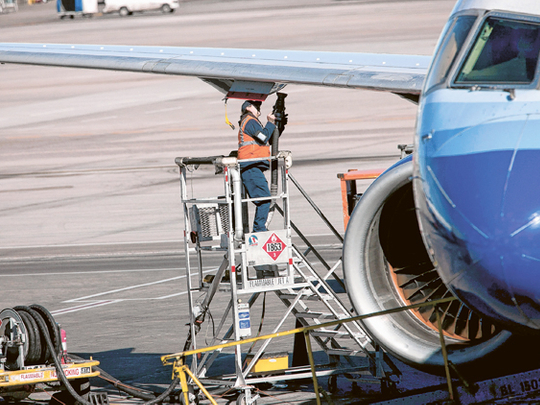
New York: The cost to protect airline debt climbed as crude oil rose above $113 (Dh414) for the first time in 30 months.
Credit-default swaps on AMR and Continental Airlines surged as oil climbed 2.5 per cent after Barclays Capital said strikes on Libyan fields by forces loyal to Muammar Gaddafi ended hopes for a prompt export resumption and may send prices toward $130 a barrel.
"The whole margin story's going to be a big issue this quarter to see how much rising commodity prices have affected the bottom line," said Adam Richmond, a strategist at Morgan Stanley in New York. "Sectors that are very sensitive to commodity prices from consumer discretionary, retail, travel, sectors like that, this is a big focus."
Airlines are "all very worried" about crude oil prices, AMR Chief Executive Officer Gerard Arpey said at a conference in Dallas.
Credit-default swaps on AMR soared to 21 per cent upfront, according to broker Phoenix Partners Group. That's in addition to 5 per cent a year, meaning it would cost $2.1 million initially and $500,000 annually to protect $10 million of AMR's debt. Swaps on United Continental Holdings, Delta Air Lines and JetBlue Airways. jumped to a mid-price of 8.5 per cent upfront, the data show. Swaps on Continental Airlines increased to 7.5 per cent upfront.
Markets
Crude oil for May delivery rose $2.77 to $113.07 a barrel on the New York Mercantile Exchange, the highest settlement since September 22, 2008. Futures advanced 4.7 per cent last week and are 32 per cent higher than a year ago. Jet fuel surged 3.4 per cent to the highest since September 2008.
The cost to protect debt of Expedia surged after the biggest online travel agency by revenue said it will split into two businesses. Credit-default swaps jumped 20.1 basis points to 174.8, the highest level since September 23, CMA data show.
The cost of protecting corporate bonds from default in the US was little changed.
The Markit CDX North America Investment Grade Index held at a mid-price of 93.7 basis points in New York, according to index administrator Markit Group.
Investors use the measure to hedge against losses on corporate debt or to speculate on creditworthiness.
The credit swaps index, which typically falls as investor confidence improves, dropped as much as 1.6 basis points earlier, after Thursday's 0.9 basis point rise.
"The aftershock in Japan created somewhat of a scare, and because that's turned out to not have a major negative impact, the market's rallying back a little bit," Richmond said.
No unusual conditions were observed at Tokyo Electric Power Co.'s Fukushima Daiichi nuclear plant after a magnitude-7.1 temblor in Japan killed two people and injured 93 in the biggest aftershock since the day of the March 11 disaster.
In Germany, Europe's largest economy, exports grew more than forecast in February as the global recovery boosted demand, the Federal Statistics Office in Wiesbaden said.
Earnings for members of the Standard & Poor's 500-stock index are expected to show 7.7 per cent growth for the first quarter compared with the similar period of 2010, according to a Bloomberg survey.
The price of Markit's CDX North America High Yield Index climbed 0.1 percentage point to 102.9 per cent of face value. The high-yield index gains as investor confidence improves.
Credit swaps pay the buyer face value if a borrower fails to meet its obligations, less the value of the defaulted debt. A basis point equals $1,000 annually on a contract protecting $10 million of debt.












